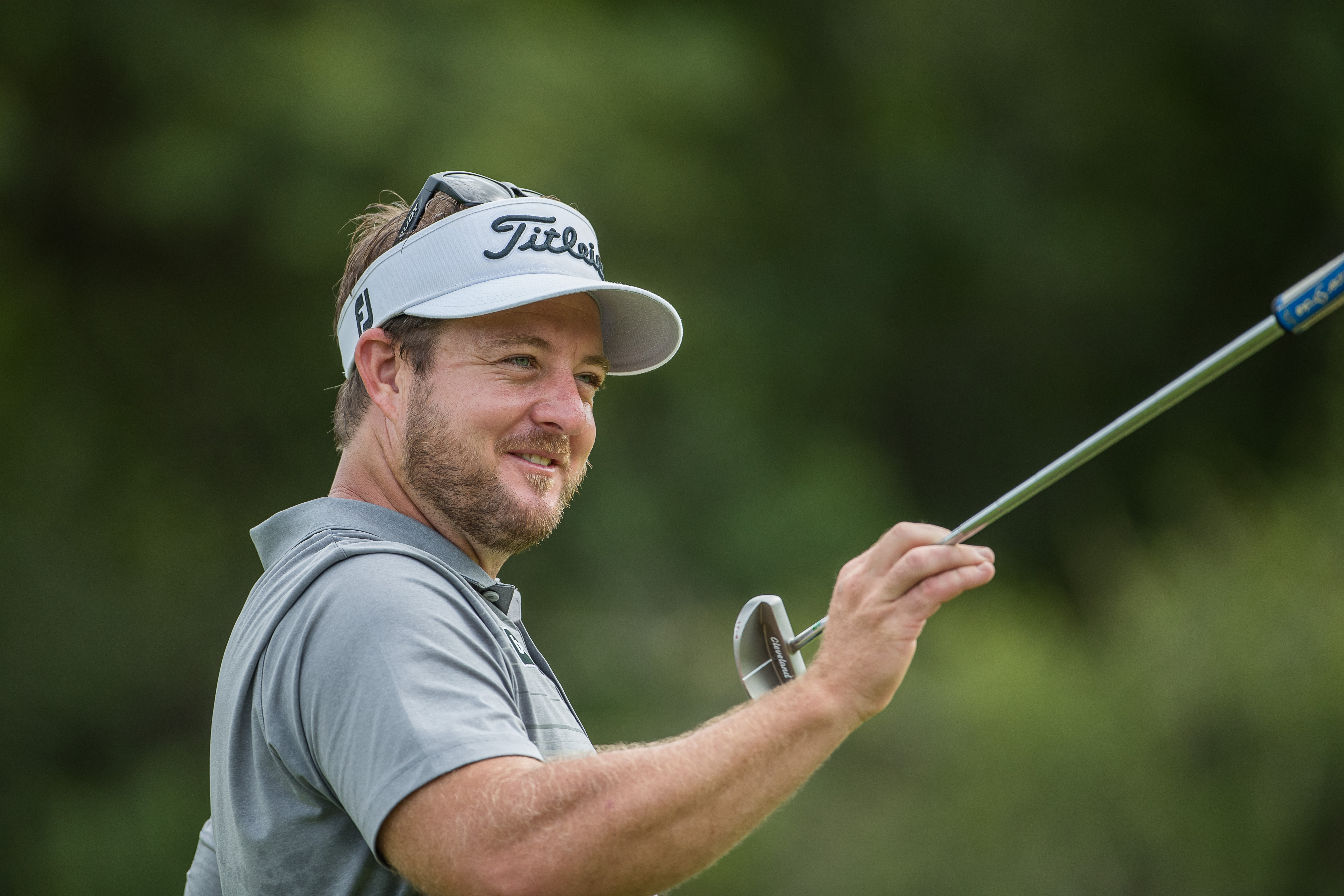For most professional athletes, the greatest battles are fought in the public eye: on the greens, in the stadiums, under the glare of the world’s expectations. For Merrick Bremner, a seasoned South African pro golfer with a swing as smooth as his temperament, the most profound test of his life unfolded far from the fairways. It was not a clutch putt or a sudden-death playoff that defined him, but a decision made in the quiet intimacy of love and crisis: to donate a kidney to his ailing wife.
This is a story not just of medical marvel or athletic resilience, but of devotion, patience, and the power of giving. It is a story that, by all accounts, is unprecedented in the world of professional golf, a gesture as rare as it is noble.
The Diagnosis: When the Game Changed
At dawn, as the city outside still slept, Merrick Bremner lay in a hospital bed, the ache in his side a small price for the peace he saw on his wife’s face. For the first time in years, neither of them had to think about dialysis. “That extra hour of sleep,” he says, “it feels like freedom.”
Bremner’s wife Povesh had always been his partner in every sense: his doubles partner in tennis, his travel companion, his confidante. But when her health began to fail, and dialysis became a daily reality, the rhythm of their life together was shattered.
“I was actually born with small kidneys,” she explains. “That’s why they packed up. It’s not because I did something wrong.”
The couple’s world shrank to the routines of illness: early mornings, prepping for dialysis, the constant fatigue and uncertainty.
“I don’t have to wake up at 4.30 every morning and prepare coffee and sandwiches for these dialysis treatments anymore,” Bremner (39) reflects. “It’s still early days and we’re still recovering, but we’re already feeling the difference.”
The Decision: Love in Action
For Bremner, the decision was instinctive, but not without fear. “I knew the risks,” he admits. “Golf is my career, but she’s my life. If I had to choose, it was always going to be her.”
Dr Carla Wilmans, transplant manager at Wits University Donald Gordon Medical Centre, explained the risks involved: “Kidney donation involves major abdominal surgery and would therefore carry the usual risks like bleeding and infection. However, almost all of our kidney donors recover well with very little in the way of complications and usually spend only a night or two in ICU and are home in about four to five days. Interestingly, it has recently been shown that kidney donors tend to live longer most likely due to the rigorous evaluation and post-operative follow-up care.”
It was a natural extension of the partnership Merrick and Povesh had always shared. “We’ve always been a team,” he says. “Now, with this new freedom, it feels like we’ve been given our life back. Now she’s going to be full of energy . . . watch out, world, we’re coming.”
While other golfers have championed organ donation or had family members receive transplants, Bremner’s direct, life-saving gift to his spouse appears to be a unique act within the sport’s professional ranks. This selfless decision transcends the fairways, highlighting a profound personal commitment that reshapes the narrative of what it means to be a champion. His story is a powerful testament to love, resilience, and an unparalleled act of generosity.
The Journey to Surgery: Patience Tested
But the journey from decision to operation was anything but smooth.
“My patience was tested a lot,” Bremner admits. “If I want something done, I want it done yesterday, not next week. But this process taught me patience. It’s long, and there’s so much out of your control. You have to stay calm, or you’ll throw in the towel.”
Said Dr Wilmans: “In the case of Merrick and Poveshnie, because they are biologically unrelated and of different ethnicities, the odds of a negative cross-match were slightly lower than usual. Usually related donors and recipients are easier to cross-match as they share the same DNA. We are always looking for a negative cross-match result, one of the only times a negative result is something to celebrate.”
There were delays, some unavoidable, some simply the result of a system under strain.
“On the day as well, things happened,” says Povesh. “When Merrick went in, he got pushed aside because there was a child in there for a liver transplant, an emergency. That really pushed the process further, but it was out of anyone’s control.”
The Operation: A Leap of Faith
The day of the operation was filled with both relief and anxiety. Bremner’s athletic mindset, his ability to focus, endure, and push through discomfort, served him well.
“Physically, I don’t feel any change,” he says. “I can’t tell you when I wake up in the morning that I’ve only got one kidney now. I feel exactly the same, just a little bit sore from where they cut, but otherwise, life’s better.”
He laughs about his time in the hospital, recalling how he insisted the nurses remove his catheter so he could go to the bathroom on his own. “I told them to take the catheter out, which forced me to have to go to the toilet by myself. The day after surgery, I told the nurse to take it off. I said it’s too uncomfortable. She’s like, but you need it. I said, oh, it’s fine.”
Such moments, both light and serious, peppered their recovery. “I kept ringing the bell. Take me off this machine, I need to pee. Eventually, we got into a routine where they just gave me a bottle.”
The Recovery: Patience and Perspective
Recovery, for both Bremner and his wife, has been a lesson in patience and humility.
“Days are quite long. I won’t lie. I do feel a little bit more tired, but sooner where I was always full of energy. But I still make it through the day okay. I just get to 8pm and feel like, okay, now I can have a lekker dos, and then I sleep.”
Dr Wilmans highlights the special considerations for professional athletes: “Given the unique physical demands of professional sport, the recovery for professional athletes is often longer than normal as very careful consideration and collaboration needs to take place between the medical teams and the transplant team. Whilst recovery to normal day-to-day activities is usually four to six weeks, the return to pre-surgical sporting performance levels can take up to six months. Careful tailoring of nutritional and hydration plans as well as training plans are needed to ensure safe and steady return to peak performance.”
Her centre’s experience with Bremner is pioneering. “This is our first living kidney donor that we have had who is a high-performance athlete and we are grateful to have been given the opportunity at Wits Donald Gordon Medical Centre to walk this journey with Merrick and Poveshnie. They are paving the way for more professional athletes to consider this life-saving decision.”
His doctors have been cautious, urging him to take things slowly. “They said to me that you need to take six to eight weeks to heal. My doctor is very conservative. Even with driving the car, initially, when you go home you’ll be able to drive short distances. But then my other surgeon said let’s give it a few more days. Because if you push it too hard now, maybe you do something wrong and then you end up prolonging your recovery process. So I think I’m just going to stick to what the guidelines are.”
He laughs about recently trying to hit a small chip shot while helping his son practice golf. “It didn’t feel so wow. So what they said is you wait that period of time and then you go hit a shot and if it still doesn’t feel right, then leave it another couple of days and then go and do it again. It’s all on how you feel and you have to listen to your body.”
The Impact: A New Lease on Life
For Bremner’s wife, the change has been immediate and profound. No more dialysis. No more constant fatigue. The prospect of travel, of adventure, of simply living, has returned.
“Just to enjoy the time together now that we have this freedom, this new-found freedom. We’ve always travelled together,” he says. “We may argue and bicker, as married couples do, but we don’t ever have a row or fight properly. She’s the best travelling partner anyone could ever wish for. She’s my doubles partner in tennis as well. And I’ve got her back full throttle, and now she’s going to be full of energy.”
For Bremner, the experience has been transformative. “Part of my plan is to try and create an awareness campaign, whether that be through golf or a fundraiser. I want to try and create some form of awareness to let other athletes, not only golfers, but other athletes in South Africa, know that it’s okay to do things like this. It doesn’t take that much of a toll on your body. I can only do the storytelling once I’m fully healed and recovered and I can say to them, look, I did it in X amount of time. So it’s a very small price to pay if you look at the bigger picture.”
The Athlete’s Mindset: Golf and Beyond
Golf remains a central passion, but Bremner’s perspective has shifted.
“I still have a lot of wins in me, and I want to win a lot of golf tournaments. I definitely want to play overseas. So it hasn’t changed. I think I’ve got a little bit more time and a bit more hunger now. I just can’t wait to go.
“My goal is obviously to end up playing in America, and if that means that I need to go via Europe, then that’s the way we got to go. What this whole journey has taught me is it’s all about a process. You can’t leap before you run and you can’t run before you crawl. You’ve got to just go slowly. And that’s what I did so well early on in my career.”
He’s pragmatic about the logistics of family life and career.
“We are one unit. We’re one family. Wherever the golf takes us, we adjust. If we end up in Europe for a quick stint or whatever, then I think initially we won’t move or do anything foolish until I have full status. If I have full status, then it’s a lot easier to plan. Or if you have a winner’s category, then you know for the next X amount of time, you’ve got a guaranteed job. But it’s hard to do it if you have conditional status which would disrupt our son Max’s life and his schooling and things like that. But if we were to gain full status, then we definitely would be about moving across.”
The Message: Giving as a Way of Life
Asked what he would say to others considering organ donation, Bremner is clear.
“To be open-minded and not think about how sore it’s going to be or whatever, and rather focus on the positives and how positively you could impact the recipient’s life. If you constantly think about how you’re going to be because you’re donating, you’re not helping yourself. You need to think about the other person. If you put yourself in that person’s shoes, how thankful would you be if someone were to donate an organ to you or to somebody to help you?”
He credits his mother for instilling this value.
“I was taught from a very young age by my mom that you give with an open heart. Not expecting anything in return. And if you’re able to give, you give.”
The Lessons: Patience, Resilience, and Hope
The journey has tested and reshaped Bremner’s understanding of resilience and hope.
“My patience was tested a lot. If I want something done, I want it done yesterday, not next week. I tried to put the message across to every transplant coordinator or person that I dealt with: stop treating me as a number. Think of it, if it were you giving to your son or to your brother or whoever, how promptly would you want this to be dealt with?”
Povesh acknowledges the dedication of the medical teams, and the reality that some things are simply out of anyone’s control.
“There’s nothing you can do about it. Merrick doesn’t have patience, and so his learning curve was about patience and how much patience you need to have through this process. It tests you. I have a lot of patience.”
Bremner, an eight-time winner on the Sunshine Tour, sees parallels between the patience required for recovery and the patience needed on the golf course.
“The patience required to get to the point that we got to when w were able to donate is what I can use to help me on the golf course as well. You need to be patient. You need to be calm. You can’t get hot-headed because if you allow it to irritate you, you’ll just throw in the towel. It is a long-winded process.
“I’m not going to tell anyone that if you decide today you want to give someone a kidney, that it’s going to happen in the next week or so. It will not happen like that. It’s going to take three months if you’re lucky, and then it’s all about getting a date.”
The Future: Hope and Ambition
Looking ahead, Bremner is filled with hope, for golf, for life, for the simple joy of being together.
He is also aware of the rarity of his story in professional sport.
“I know there’s one guy who was a professional cyclist and he donated to his wife. Three months later he was back on the bike. My doctor told me about it. I joined a Facebook group, kidney donor athletes, in the US. A lot of them do Iron Man and things like that, but I joined in the hope to try and speak to a golfer and I found a weekend warrior, a once-a-week guy who was back to swinging after three months. But swinging once a week versus swinging every day for six or seven hours at a time are two completely different things.”
His own forecast for returning to competitive golf is cautious but optimistic.
“They said to me that you need to take six weeks to eight weeks to heal. My doctor is very conservative and cautious. I think I’m just going to stick to what the guidelines are. It’s all on how you feel and you have to listen to your body.”
The Legacy: More Than a Game
For Bremner, the journey has been about more than golf, more than even the gift of life. It has been about partnership, resilience, and the quiet heroism of everyday love.
“It’s a very small price to pay if you look at the bigger picture.”
As he prepares to return to the sport he loves, Bremner does so not just as a golfer, but as a champion of another kind, a man who has given, and gained, more than he could ever have imagined.
For him and his wife, the fairways ahead are wide open, filled with possibility, and, above all, with hope. – Clinton van der Berg (gotgame.co.za)






































